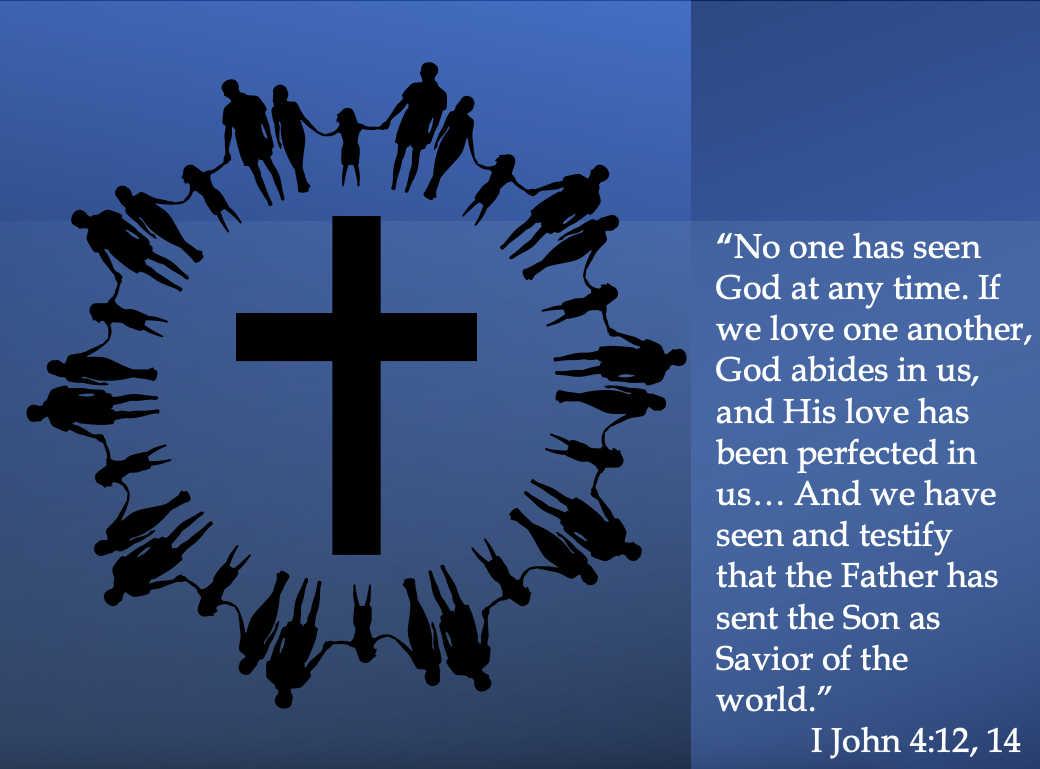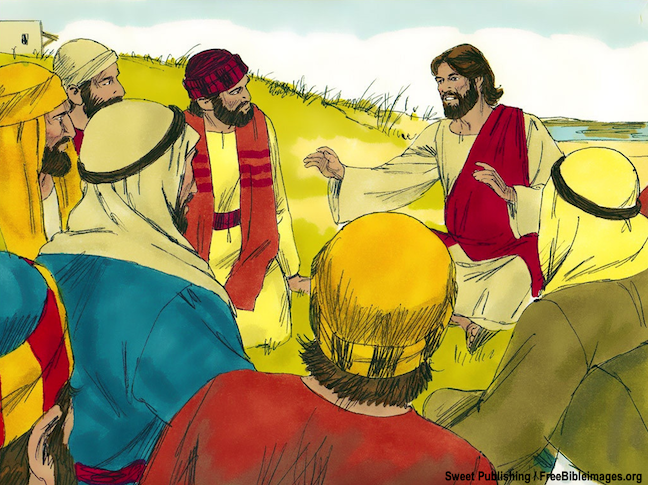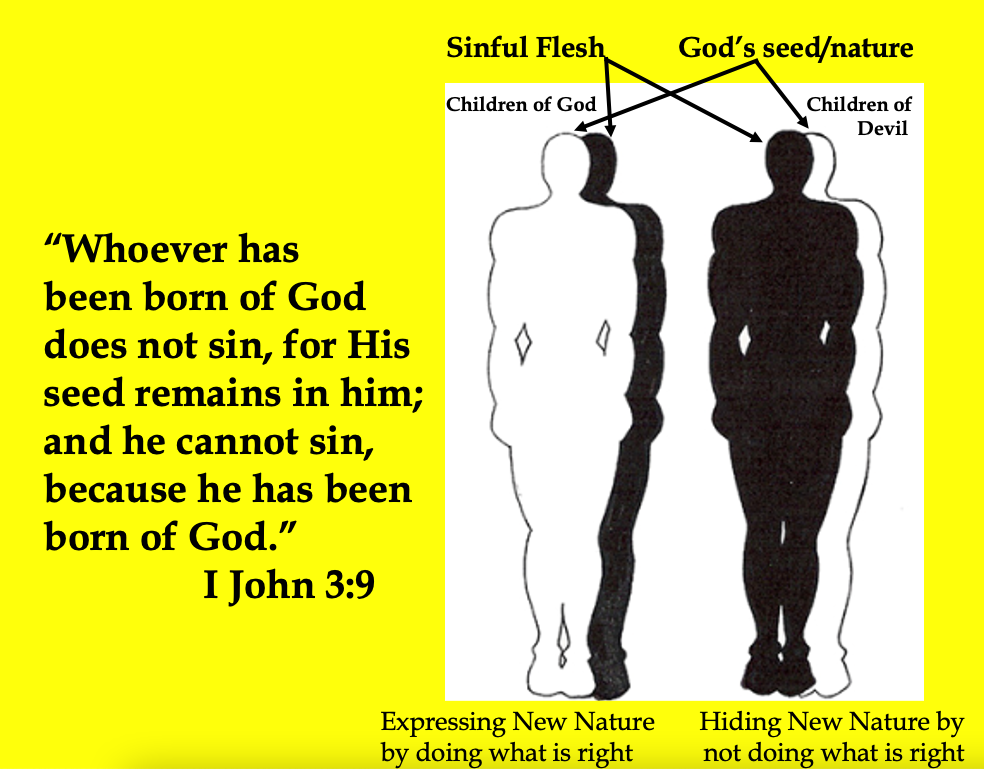“Love has been perfected among us in this: that we may have boldness in the day of judgment; because as He is, so are we in this world.” I John 4:17
It is important to understand that the New Testament speaks of two different judgments separated by the Millennium or one-thousand-year reign of Jesus Christ on earth. The first judgment is for believers in Jesus at the Judgment Seat of Christ which takes place in heaven after the Rapture of the Church (Rev. 4:1-4; cf. Rev. 22:12; John 14:1-3; I Cor. 3:8-15; 15:51-52; 2 Cor. 5:10-11; I Thess.1:10; 4:13-5:11). The second judgment is for nonbelievers after the Millennium (Rev. 20:1-10), and it is called the Great White Throne Judgment (Rev. 20:11-15).
Those who appear before the Judgment Seat of Christ (I Cor. 3:8-15; 2 Cor. 5:10; Rev. 22:12) and the Great White Throne Judgment (Rev. 20:11-15) are judged “according to their works,” not according to their faith or the lack thereof. Since every person is judged “according to their works” at both these judgments, there will be differing degrees of punishment for nonbelievers in the lake of fire as determined by the Great White Throne Judgment (Rev. 20:11-15; cf. Matt. 11:20-24; 23:14; Mark 12:40; Luke 20:47), just as there will be varying degrees of rewards for believers as determined at the Judgment Seat of Christ (I Cor. 3:8-15; 2 Cor. 5:10; Rev. 2:25-27; 4:1-4; 22:12).
The apostle John began the body of his epistle in I John 2:28. It was there that he introduced a new theme of having “confidence” instead of shame before the Lord Jesus “at His coming” to motivate his readers to continue to cultivate fellowship or intimacy with Christ despite the increase in false teachers or “antichrists” (2:18-27). 1 The Greek word translated “confidence” (parrēsia) there refers “to a state of boldness and confidence, courage, confidence, boldness, fearlessness, especially in the presence of persons of high rank.” 2 Throughout the body of his epistle, John has focused on how to have more “boldness” or “confidence” both when the Lord Jesus returns (2:28) and when we pray (3:21-22).
Some Christians assume that they could not possibly experience shame at the Judgment Seat of Christ because all their sins were forgiven the moment they believed in Christ for His gift of salvation (Acts 10:43; Col. 2:13-14). But the apostle John reminds us it will be possible for transformed Christians (I John 3:2-3) to experience shame before the Lord Jesus (I John 2:28) when He evaluates both the “good or bad” things they have done in their Christian lives (2 Cor. 5:10). Keep in mind that Revelation 21:3-6, which speaks of there being no more death, nor sorrow, nor pain, takes place after the Judgment Seat of Christ (Rev. 4:1-4) and the Millennium (Rev. 20:1-10). In our transformed bodies (Phil. 3:20-21; I John 3:2), we will probably be more sensitive to sin because our sin nature will be gone along with its excuses and rationalizations for sin (I John 3:2-3). We will have a greater capacity to feel holy shame over sins that we committed on earth.
“It is true, of course, that the Lord Jesus by His death on the cross took away all of our sins, past, present, and future (John 1:29; 1 John 2:2). Sin is no longer a barrier to anyone having eternal salvation. The moment we believe in Jesus for eternal life, He gives it to us. Eternal life, however, does not exclude accountability. Believers still need fellowship forgiveness (1 John 1:9). And if a believer is out of fellowship with God when his life is over, he will experience shame at the Bema.” 3
John now concludes the body of his epistle (I John 4:17-19). “Love has been perfected among us in this: that we may have boldness in the day of judgment; because as He is, so are we in this world.” (I John 4:17). John uses the same Greek word translated “boldness” (parrēsia) that he used in 2:28 and 3:21 where it was translated as “confidence” in the New King James Version.
In I John 4:12, John spoke of perfecting God’s love “in us” (en hēmin) when we love one another with the same sacrificial and selfless love that Christ extended to us (4:12-16; cf. 4:9-10). When God’s love reaches completion “in us,” there is no hate in our relationships with other believers. In 4:17 when John speaks of perfecting God’s love “among us” (meth’ hēmōn), there is no fear in our relationship with God, especially as it relates to “the day of judgment” (4:17-19). 4
When John refers to “the day of judgment” (4:17), he does not mean the final judgment of the unsaved which determines the degree of their punishment in the lake of fire (Rev. 20:11-15). He is speaking here of Christians appearing before the Judgment Seat of Christ which will take place in heaven after the sudden removal of the church from the earth (cf. Rom. 14:10-12; I Cor. 3:8-15; 2 Cor. 5:10-11; I John 4:17-19; Rev. 4:1-4).
A believer may have “boldness” that Christ will approve of his or her Christian life if he or she has entered a mature experience of God’s love (“love has been perfected among us”) by loving other brothers and sisters in Christ. Our “boldness” arises from doing what we know Christ wants us to do – namely love one another (cf. John 13:34-35).
The reason a loving Christian will have no fear before Christ at this time is “because as He is” loving, “so” we can be loving “in this world” as well (4:17b). The more loving we become in our relationships with God’s people, the more we will become like our Judge, Who “is love” (4:8, 16). An unloving believer is not like his Judge so he may be afraid of rebuke or loss of reward as he anticipates standing before Christ at the Judgment Seat (cf. Matt. 24:48-51; 25:24-30; Luke 19:20-26). But a loving believer is one in whom the work of God’s love has been “perfected” or made complete, and the benefit of that is boldness before the One Who will judge him. 5 Mature love expels fear when moral likeness exists between the Judge and the one being judged.
“God’s love is not perfected in a Christian whose heart is simply a reservoir in which to receive it, but only in a Christian whose heart furnishes an aqueduct to convey it to others.” 6
“Every believer will stand before the judgment seat of Christ. Don’t think of it as a trial to determine your salvation but as the Judge’s opportunity to evaluate the Christian life you lived (see 2 Cor. 5:10). In spite of your sins and failures, if you actively sought to minister in love to members of God’s family, you will be able to stand with confidence on that day because ‘love covers a multitude of’ offenses (1 Pet 4:8).” 7
“The idea of having boldness in the day of judgment is stunning. Reasonable Christians, even though fully assured of their salvation, will realize ‘the terror of the Lord’ (2 Cor. 5:11). The possibility of triumphing over that ‘terror’ is challenging indeed. Yet this is possible if believers ‘abide in love’ (1 John 4:16).” 8
I realize that some believers are opposed to the possibility of experiencing fear in heaven at the Judgment Seat of Christ. But we must remember that fear is sometimes appropriate in relationships.
“A child raised in a good home need not fear rebuke if he is doing what his parents ask. A student in school who is obeying the teacher’s rules need not fear detention. A hardworking employee who is abiding by the office regulations has no reason to fear being put on probation.
“The knowledge that actions have consequences motivates us to do right. Many Christians don’t stop to think that the same is true in our relationship with God. If we are busy doing what He wants us to do, manifesting His love to others, we need not fear discipline now or rebuke at the Judgment Seat of Christ.” 9
Like obedient children of good parents, we have nothing to fear at the Judgement Seat of Christ. We can and should be confident, for our Lord is a Judge Who is loving, gracious, and fair. He will reward believers in whom His love has matured. 10
The apostle John continues by saying, “There is no fear in love; but perfect love casts out fear, because fear involves torment. But he who fears has not been made perfect in love.” (I John 4:18). LovingChristians can anticipate standing with “no fear” before Christ at His Judgment Seat because fear cannot exist with God’s agapē “love.” As believers grow in their love for God and other Christians, God’s “perfect love casts out fear, because fear involves torment.” The more loving we become on earth now the less fear we will have as we anticipate the Judgment Seat of Christ in the future.
When John says, “fear involves torment,” the word for “torment” (kolasis) occurs only two times in the New Testament. The first time is in Matthew 25:46 where Jesus speaks of the eternal punishment of nonbelievers. Clearly the meaning of the word is “punishment” in that verse.11 In I John 4:18, it seems to speak of a temporal form of punishment.
Hodges explains, “Fear carries with it a kind of torment that is its own punishment. Ironically, an unloving believer experiences punishment precisely because he feels guilty and is afraid to meet his Judge. Such fear prohibits a completed love (one who fears is not made perfect in love). But a Christian who loves has nothing to fear and thus escapes the inner torment which a failure to love can bring.” 12
Hodges also says, “John likely has in mind the truth that ‘whom the Lord loves He chastens, and scourges every son whom He receives’ (Heb 12:6). In fact, this NT truth is found on the lips of the Lord Jesus in Rev 3:19, ‘As many as I love, I rebuke and chasten.’
“If a Christian experiences fear as he anticipates being evaluated at the Judgment Seat, then this fear can be regarded as a punishment intended to awaken him to his need to correct his behavior. Unpleasant as it is, like all divine discipline (Heb 12:11), it is nevertheless a signal of God’s love and of His desire to see believers made perfect in love. If the Christian responds to this kind of discipline, the discipline is effective and ‘yields the peaceable fruits of righteousness’ (Heb. 12:11), which for John are inseparable from love.” 13
Anderson suggests that the Greek word translated “torment” (kolasin) means restraint. It “is also used of pruning a fruit tree to stunt its growth. So, fear keeps our love from growing up. Fear of what? That which we all fear in relationships, whether it’s with God or men— rejection. Most of us are afraid of rejection from other people. Those who aren’t have felt the sting of rejection so much they have lost their ability to consciously feel at all. This fear of rejection stunts the growth of perfect love…
“… So I agree with three of my favorite dictionaries of NT Greek, which suggest ‘restraint’ as the best English translation of kolasin. In other words, fear holds us back; it restrains us. It keeps or prevents us from reaching out in sacrificial, selfless, unconditional love. But when we release the Spirit, He can and will produce the fruit of agapē love in our lives. He will cast out the fear which retrains us.” 14
The key to preparing for the Judgment Seat of Christ is underscored in verse 19. “We love Him because He first loved us.” (I John 4:19). The majority of Greek manuscripts contain the word “Him” (Auton) in this verse. It should be mentioned that the standard critical editions of the Greek New Testament omit “Him” and so do the translations based on them [e.g., JB, NASB, NIV, etc.]. This omission is unfortunate because verse 19 is critical to what follows in 4:20-21. 15
Up to this point in John’s epistle, he has been focusing on directing our love toward other Christians (“one another” – 3:11, 23; 4:7, 11-12). Now the apostle speaks directly for the first time in his letter about loving God. A Christian’s love for God originates from His love for us. If we are maturing in our love for one another and for God, there can only be one reason for this. It is “because He first loved us.” 16
As Anderson suggests, the primary reason Christians fail to love one another or God, is because of the fear of rejection. But Christ’s perfect love for us contains no such fear.
Anderson writes, “We get a real clue from the statement that we love God because He first loved us. He was the initiator. We were His sinful enemies. Time and time again He had felt the sting of rejection from us. Even after He came to earth and began to display His wonderful acts of mercy, compassion, and healing, Jesus was rejected by men. We built a high wall of rejection between us and Him. But because ‘God is love,’ perfect love, He is not afraid of rejection. It hurts. It grieves Him deeply. But He is not afraid. So, He set His cross down next to that wall of rejection built by our sins … and He climbed that wall, for you and me. We love Him because He first loved us. Fear of rejection is what keeps us from making the first move, especially if we have already been hurt a number of times by someone who means a lot to us.
“What we are saying here is that only God’s love (mature agapē) can bust through the sinful layers of self-protection which keep us from experiencing oneness with Him and other believers (intimacy/fellowship). We all enjoy the feelings of philē love in marriage, friendships, families, even church. But without growing agapē we will lose those feelings and never get them back. The mistakes we make in relationships because of our sinfulness can create enough pain to destroy all positive feelings of one toward another. But growing agapē can cast out fear. We can reach out again.” 17
No matter how much rejection we have received in the past, God’s perfect love for us can cast out our fear so we can risk loving others again. We love God because He first loved us. We cannot give what we do not have, but once we have received God’s love through faith in Jesus Christ, if we stay close to Him in fellowship, we just get better and better at loving people so we become more like our Judge Who will evaluate our Christian lives at His Judgment Seat. This is God’s climatic message to us in the body of I John (2:28-4:19).
Years ago, Princess Diana made a very interesting observation: “The biggest disease this world suffers from is people feeling unloved.” 18
If you find yourself suffering from the absence of love, there is only one lasting remedy. It is not found in a bottle, a hotel room, money, a pill, or in a syringe. It is found in the Person of Jesus Christ Who loved us without measure.
If you do not know for sure you have eternal life and a future home in Christ’s heaven, please understand that Jesus offers eternal life freely to all who believe in Him. Christ said, “For God so loved the world that He gave His only begotten Son, that whoever believes in Him should not perish but have everlasting life.” (John 3:16). Jesus did not say, “God knows how to love.” It is saying something five hundred times greater. “For God so loved the world.” To help us understand the love of God, take the word “so” and let the “S” stand for “something” and the “O” for “other.” God’s love is SOMETHING OTHER than we have ever known.
God does not love us with the love of a two-year old who says, “I’ll love you as long as you do things my way.” God does not love us with the love of a twelve-year old who says, “I’ll love you for what I can get out of you.” Nor does God love us with the love of a twenty-two-year-old who says, “I’ll love you as long as you love me in return.” Instead, He loves us with the kind of love that says, “I love you. Period.”
God’s love is a deep and unselfish love. It is not based on who you are or what you do. It does not matter if you are a great athlete, the President of the United States, or a person who pushes a broom in an office where everybody else pushes a pen. God knows where you live, He knows everything about you, and He says, “I love you!”
You have lied, and God still loves you. You have been unfaithful to your spouse, yet He loves you. You have entertained a lot of thoughts you should not have, yet He loves you. You take His name and use it as a curse word, and yet He loves you. You have tried to medicate unwanted feelings and memories in immoral ways, yet He loves you. You have harbored hatred in your heart toward those who have offended you, yet God still loves you.
Think about your friends for a minute. Some of them will love you if you are on your best behavior, but God will love you even when you are at your worst. Some of them will love you if you speak well of them, but God will love you even when you curse His name. Some of them will love you as long as you take what you have and give it to them, but God will love you even if you take everything He has given you, and never give Him a thank You. There is nothing you can do to cause God to love you any less.
When Jesus said, “For God so loves the world that He gave His only begotten Son…”, we learn that God’s love gives, it does not take. God gave His best (His Son) when we were at our worst (ungodly sinners). Our hope is based on the fact that “God gave His only begotten Son,” so that instead of you and me dying on the cross for our sins, Jesus Christ died in our place. Instead of us paying for what we have done by our own death, Christ paid for what we have done by His death.
Could you kill your only child to save others? No. Our love is pale compared to God’s love for us. When God says, “I love you. Here’s My perfect and only Son,” that is love. The greatest proof of His love is that He would allow His only begotten Son, Jesus Christ to die for our sins and rise from the dead (I John 4:9-10; cf. Rom. 5:8).
Why did Jesus do this? “…That whoever believes in Him should not perish but have everlasting life.” What does it mean to believe? The phrase “believes in Him” (pisteuōn eis Auton) means to be persuaded that Christ is speaking the truth here and is therefore worthy of your trust. 19
Will you take Jesus at His Word and believe He is speaking the truth when He says, “whoever believes in Him should not perish but have everlasting life”? Christ says you “believe” and “have.” Contrary to many evangelistic invitations today, Jesus does not say you “follow” or “obey” and “have.” He never says you “pray” or “surrender” and “have.” Nor does He say you “give” or “confess” and “have.” Christ invites you to take by faith the eternal life that He is freely offering to you. If you just did that, you can tell Him through prayer.
Prayer: Dear Lord Jesus, I need Your love in my life. I understand now that You loved me by taking my place and punishment when You died on the cross for all my past, present, and future sins and rose from the dead. I am now believing or trusting in You, Jesus (not my good life, religion, or prayers) to give me Your free gift of eternal life. Thank You for the everlasting life I just received. In Your holy name, I pray Lord Jesus. Amen.
When you believed in Jesus alone for everlasting life, He gave you eternal life which can never be lost (John 6:35-40; 10:28-29). Christ has come to live inside you through His Holy Spirit (John 7:37-39; Ephes. 1:13-14). As you learn to abide in Him and His Word with other believers, His love will be poured out into your heart so you can share it with others (I John 2:3-6, 28; 3:14-4:16; cf. John 15:4-17; Rom. 5:5). The more loving you become in your relationships with God and other Christians, the less fear you will have as you anticipate the Judgement Seat of Christ because you are becoming more like the Judge (I John 4:8, 16) Who will evaluate your Christian life.
Prayer: Heavenly Father, if we are honest, there are times in our lives when we are afraid to love others because of the rejection we have experienced from people in the past. Our fears keep us from initiating contact with others. Thank You, Jesus, for showing us that Your perfect love is not afraid of rejection. It hurts You deeply when we reject You, but out of love for each of us You still endured the cross so we may be in a loving relationship with You. Please help us grow in Your perfect love so we can break out of the many layers of self-protection and experience deeper fellowship with You and other Christians. We invite You to love others through us so we may have more confidence and less shame when we stand before You at the Judgment Seat of Christ. In the mighty name of Jesus, we pray. Amen.
ENDNOTES:
1. Tom Constable, Dr. Constable’s Notes on I John, 2022 Edition, pg. 65.
2. Walter Bauer, A Greek-English Lexicon of the New Testament and Other Early Christian Literature: Third Edition (BDAG) revised and edited by Frederick William Danker (Chicago: University of Chicago Press, 2000 Kindle Edition), pp. 781-782.
3. Robert N. Wilkin, The Road to Reward: A Biblical Theology of Eternal Rewards Second Edition (Corinth, TX: Grace Evangelical Society, 2014 Kindle Edition), pg. 21.
4. Constable, Dr. Constable’s Notes on I John, pp. 101-102.
5. Zane C. Hodges, The Bible Knowledge Commentary Epistles and Prophecy, Editors John F. Walvoord and Roy B. Zuck (David C. Cook, 2018 Kindle Edition), Kindle Location 4000 to 4006.
6. Wilkin, The Road to Reward, pg. 22 cites Zane C. Hodges, The Epistles of John: Walking in the Light of God’s Love (Denton, TX: Grace Evangelical Society, 1999), pp. 198-199.
7. Tony Evans, CSB Bibles by Holman, The Tony Evans Bible Commentary (B & H Publishing Group, Kindle Edition, 2019), pg. 2949.
8. Zane C. Hodges; Robert Wilkin; J. Bond; Gary Derickson; Brad Doskocil; Dwight Hunt; Shawn Leach; The Grace New Testament Commentary: Revised Edition (Grace Evangelical Society, Kindle Edition, 2019), pg. 601.
9. Wilkin, The Road to Reward, pg. 21.
10. Ibid., pg. 22.
11. Bauer, A Greek-English Lexicon of the New Testament, pg. 555.
12. Hodges, The Bible Knowledge Commentary Epistles and Prophecy, Kindle Location 4013 to 4018.
13. Hodges, The Grace New Testament Commentary, pg. 601.
14. David R. Anderson, Maximum Joy: I John – Relationship or Fellowship? (Grace Theology Press, 2013 Kindle Edition), pp. 218-219.
15. Hodges, The Grace New Testament Commentary, pg. 601.
16. Ibid.
17. Anderson, Maximum Joy, pp. 218-219.
18. R. Larry Moyer, Show Me How To Illustrate Evangelistic Sermons (Grand Rapids: Kregel Publications, 2012), pg. 209 cites Princess Diana in Time, September 8, 1997.
19. Bauer, A Greek-English Lexicon of the New Testament, pp. 816-817.













